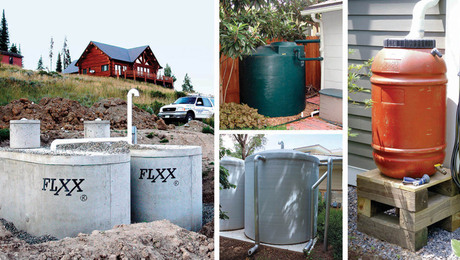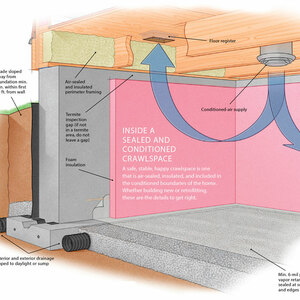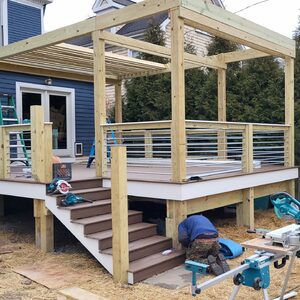Keeping the pump house warm enough
On the current project we are building a shed that will house the water system… a 1000-gal storage tank, a 119-gal pressure tank, and the associated exposed piping. The shed is to be well insulated but the owner is concerned about the possibility of a freeze occurring when the power is out, so a cheap baseboard heater won’t suffice. I can run propane to the shed and of course there are small wall heaters that would work, but I can’t find a t-stat that turns on much below 45 degrees. That will waste a lot of gas. What I want is something that turns on when it gets to 32 inside the shed. Whatcha think?


















Replies
David;
I know they make alarms that go off when the temps get real low. Farmers use them to prevent plants from getting frozen. (Usually they turn water on the plants IIRC.)
Maybe David Doud could turn you on to one of the alarms. I think once you have that, it should be easy enough to convert it to your use.
Hope it helps.
Don K.
EJG Homes Renovations - New Construction - Rentals
why not heat trace the tanks and plumbing
anyway, here is a stat you might use;
http://www.pecomanufacturing.com/products/factsheets/T115.pdf
.
.
.
, wer ist jetzt der Idiot ?
You mean heat tape? This has to work with no power...
heat tape yes, just not the hardware store variety
but someone is going to have to remember to fill the propane and I've never had a problem with our tank in the unheated crawl herewhy not just insulate the tanks then.
.
.
., wer ist jetzt der Idiot ?
Heat tape?
What about heat tape with a generator, or inside the house in a seperate built on room? Less equipment I think, as well as using the same heat in the house...
I have a hard time believing that if you put a 1000 gallon storage tank and a booster pump alolg will the other plumbing in a insullated room that freezing would be a problem, with or without power. It doesn't get that cold on the Pugent Sound. A 1000 gallon tank of water contains alot of BTU's
If you don't have power, how will the booster pump work? So what is the point?
maybe a small back-up generator in the shed will work in a power outage...
Yeah, there is a lot of mass there ... the tank won't freeze, but if it is allowed to freeze in the space ... the smaller mass of piping could still potentially freeze.
1000 gallons of water at groundwater temp (~52 degrees) is a pretty good source of heat. Superinsulate the shed (e.g. R-21 batts and a continuous layer of 2" Thermax on the inside) and keep a single light bulb on during the winter. I'd think the power would have to go out for at least a couple of days before it went below freezing in the shed, as long as there are no air leaks. If the floor is elevated, build and insulate a tight skirt. If on a slab, consider frost protection (vertical foam beneath the perimeter of the slab down to max. frost depth, but NO foam under the slab to allow ground heat to migrate up). For the price of a gas wall heater and related labor to install, HO could purchase a small generator to run an electric heater for emergency use. My suggestions may be moot if extended outages are the norm in this location.
Since you are in this area, using ground source heat may work. Run the heat loss calcs for ground source heat - wall and roof insulation heat loss vs. what comes up thru the 50F or so ground.
Own pumphouse has approx R-20 walls and R-30 ceiling, air sealed good enough that you have to close the door slowly or the increased air pressure wont let it close.
Floor has the 8" well pipe and 3-1/2" concrete floor. Slab edge is insulated to 18" deep with 4" of styrofoam.
Worst case 100 year weather in Renton is 8F, probably even higher on the island. At that temp, the heat from the well pipe and the concrete floor from 50F ground keeps the inside temp above 32F. My pump house is relatively large for the ground source heating calcs to work out, 12 foot by 10 foot floor area, do have one triple insulated 14" wide window. Every crack sealed and door with good weatherstripping.
Last year it got down to 17 F one night, the pump house was a balmy 38F IIRC.
Gentlemen, I personally do not have any concern about pipes freezing in this situation, even with the power out for a few days. However, my instructions are to install a completely automatic setup for keeping the building warm. It cannot rely on grid power or a generator. This owner travels a lot, has no taste for handling equipment, does not want to have a caretaker, and wants the water system guaranteed not to freeze. Although I can be 99% sure that insulation alone is enough, I can't go that extra 1% and therefore we seem destined to install a heater. In a 100-year event it would be needed.
Not sure what your solution will be but don't forget to provide an intake for makeup air if you wind up going with a ventless combustion appliance. Let us know what you decide.
Do they make heat tape in 12v ?If so, then get the minimal tape, photovoltaic panels and a deep cycle battery. That whould work even in our grey wintertime.
Get your head out of the box.
I just had this vision of your HO coming home from a trip after a week of record-setting low temps and no power, to find his pump house toasty warm and his house frozen hard as a rock!
What's he doing to keep his house from freezing during a power outage? Do the same thing in the pump house. The house lines will probably freeze before the pump house does.
Dunno why -- just struck me as funny.
Mike HennessyPittsburgh, PA
What's he doing to keep his house from freezing during a power outage? Do the same thing in the pump house. The house lines will probably freeze before the pump house does.
Good comment, but here is my case history for PNW climate - prior to my present pump house with larger floor sizing.
1970's, went back the IL for Christmas, had 8F in Seattle area with power outage (lowest in the 40 years we've been here) and the pump house froze up (the above ground pump froze and broke, tank was OK).
At that time the pump house was only 5 ft by 5 ft with 6 ft high walls, not enough ground area and too little insulation. The house, which has close to 1600 sq ft basement with floor 7 ft below surface level ground, had no freeze damage.
One of the big reasons the pump house now has a much larger footing area.
Put every thing under ground in a well pit with a well constructed, and critter proof lid.
This will take care of the heat problem if the lid is well insulated and draft free.
If the building is already up go with the gas heater and lots of insulation, so it doesn't kick on as much.
This's going to be a tough nut to crack. Without electricity the ony thing I can think of is having separate water system with a tank buried to act as thermal storage and run RFH through the slab and let convection do the work. A backup for the electric would be pretty expensive for the safety it's providing.
I thought Luka had a good idea.
But if they don't make 12v heat tape, how about an inverter with his solar setup?
Or an inverter and an automatic transfer switch? I've seen inverters with built-in transfer switches that will switch back and forth from grid power to battery power as needed...
Just another 2 cents to muddy the water.
-Sawdaddy
heat tape will heat on 12 volts but it will only give you 1% of the heat it does on 120 volts.
But, with enough insulation, that may be all that is needed.
but I can't find a t-stat that turns on much below 45 degrees.
check refrigeration supply places - there's a thermostat on my cooler that goes from 0-60*F - it switches a 110v relay, I don't know if you could make it would work in your situation -
have you checked out modifying a higher temp thermostat?
Make an earth sheltered shed. Should be above freezing inside at all times.
David,
Tek Supply has some Durostat thermostats that go down to 30º. These are 110 volt. Battery and inverter?
Web site seems to be down. 1-800-835-7877
KK
Edited 11/5/2007 8:58 pm by coonass
Have a look here:
http://www.cetsolar.com/empire.htm
Scott.
Always remember those first immortal words that Adam said to Eve, “You’d better stand back, I don’t know how big this thing’s going to get.”
Seems if the shed is well insulated, well sealed, and well connected to the ground ... and someone said you were in the Seattle area? I'd think the risk is fairly low ... the power would have to be out a long time for the shed to freeze. Are long term outages expected? I'd think it would survive a day or two in severe conditions.
Also, re: the T-stat - generally, it is commong practice to set such a 'freeze stat' well above 32 ... Like minimum 35 and often 40.